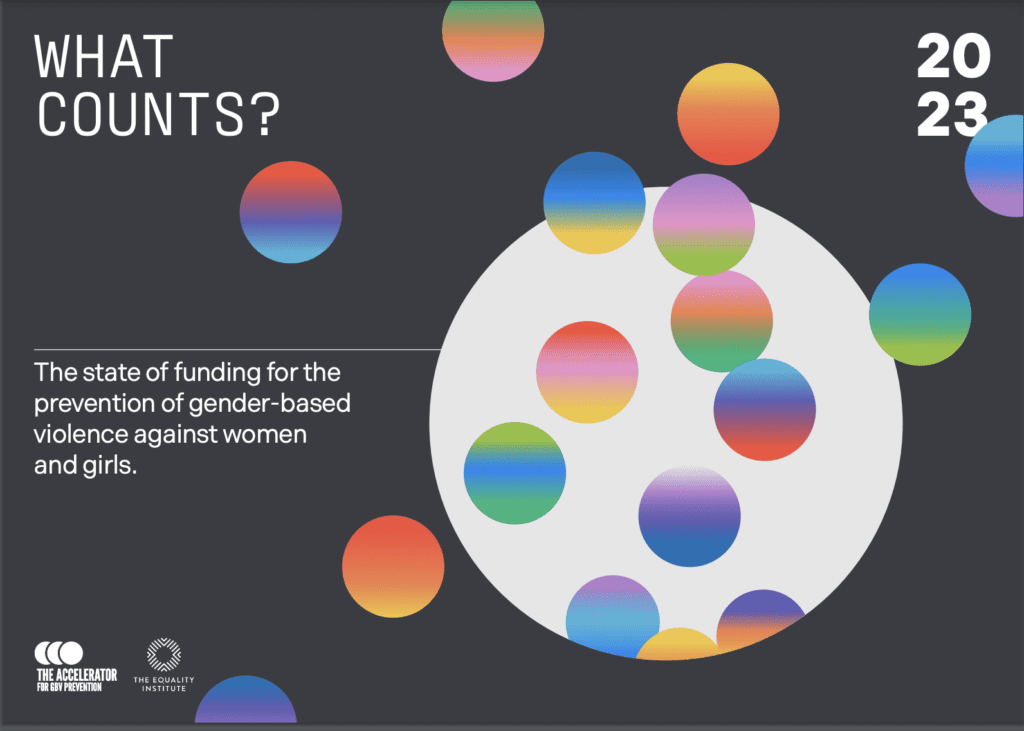Ending violence against women is severely underfunded – a new report reveals

A new sobering report has revealed that in 2022, countries around the world spent USD 204 billion in overseas development assistance – but of that sizable sum, only one-fifth of one percent was spent on preventing gender-based violence (GBV). And UNWomen – the United Nations entity dedicated to gender equality and the empowerment of women – is leading the call for bold investments in ending the endemic scourge.
Ahead of the International Day for the Elimination of Violence against Women on 25 November, a report “What Counts? The state of funding for the prevention of gender-based violence against women and girls” by UN Women partners, the Equality Institute and the Accelerator for GBV Prevention, working together under the Collective Commitment of the Generation Equality Action Coalition on GBV reveals a concerning reality: gender-based violence, an issue of alarming proportions, garners only 0.2% of global aid and development funding.
The report comes as the world kicks off the 16 Days of Activism against Gender-Based Violence, from 25 November to 10 December, under the global theme set by the UN Secretary-General’s UNiTE campaign, “UNITE! Invest to prevent violence against women and girls”.
As the world marks the halfway point to the 2030 Agenda for Sustainable Development, the urgency to end violence against women and girls has never been greater. UN Women’s Gender Snapshot 2023 report reveals that 245 million women and girls continue to face physical and/or sexual violence from their intimate partners each year. A staggering 86 percent of women and girls live in countries without robust legal protections against violence, or in countries where data are not available.

Additionally, the impacts of economic crises, conflicts, and climate change have heightened the vulnerability of women and girls to violence.
“It is time to get serious and fund what we know works to stop violence against women and girls. Invest in reforming and implementing laws and multisectoral policies. Provide services to survivors. Scale up evidence-based prevention interventions. With the will and contributions of all stakeholders and sectors, we can unlock financing, track budget allocations, and increase gender-responsive budgeting. We have the solutions and resources to end violence against women and girls in our lifetimes. It is our choice,” said UN Women Executive Director Sima Bahous at the official commemoration event for the International Day for the Elimination of Violence against Women in New York.
A strong and autonomous feminist movement is also a crucial part of the solution. Women’s rights organizations play a pivotal role in preventing violence, advocating for policy change, and holding governments accountable. However, as per the Action Coalition on GBV’s Accountability Report, they remain severely underfunded, and significant efforts are needed to increase financial support for women’s rights organizations working in this space.
Also, launched, a new research brief with estimates on gender-related killings of women and girls, produced jointly by UNODC and UN Women, shows that globally, nearly 89,000 women and girls were killed intentionally in 2022, the highest yearly number recorded in the past two decades, indicating that the number of female homicides is not decreasing. Most killings of women and girls are gender motivated. In 2022, 55 per cent of the intentional killings of women (around 48,800) were committed by intimate partners or other family members. This means that, on average, more than 133 women or girls were killed every day by someone in their own family.
16 DAYS OF ACTIVISM AROUND THE WORLD
Through the 16 Days of Activism campaign, UN Women will be calling for increased long-term, sustainable investments from states, private sector, foundations, and other donors to women’s rights organizations working to end violence against women and girls in all their diversity.
On November 22, the official commemoration event for the International Day for the Elimination of Violence against Women in New York will feature an opening address by the Deputy Secretary-General of the United Nations and remarks by UN Women’s Executive Director, and will bring together voices of Member States, women’s civil society organizations, United Nations agencies, and Leaders and Commitment Makers of the Generation Equality Action Coalition on Gender-Based Violence. In line with this year’s theme, the event will highlight best practices of investment to prevent violence against women, gaps and challenges and the way forward.
UN Women will be also leading a global social media campaign to speak up against gender-based violence using #NoExcuse and #16Days.
From a film festival in Rwanda, to a dialogue for young women in Sri Lanka, and film screenings in Egypt and Morocco, dozens of events organized during the 16 Days of Activism will aim to rally action to ensure a violence-free future for women and girls, symbolized by the colour orange.
As in previous years, iconic buildings around the world are expected to be lit in orange during the 16 Days of Activism, including the Grand Place City Hall Hôtel de Ville in Brussels, Belgium, the UN House in Dakar, Senegal, the Tbilisi TV tower in Tbilisi, Georgia, and other landmark buildings across Sweden, Pakistan and other countries.









